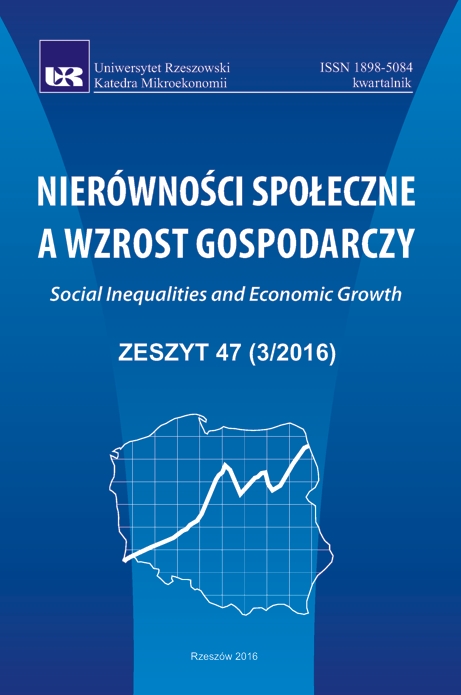Social-Economic Inequalities and Concepts of Distributive Justice Amartya Kumar Sen and John Rawls
DOI:
https://doi.org/10.15584/nsawg.2016.3.18Keywords:
distributive justice, primary goods, capabilities, inequalitiesAbstract
Analysis and discussions of philosophical-political and socioeconomic discourse on justice are characterized by great diversity. The multiplicity of approaches and perspectives stems not only from the fact of the complexity of the concept itself, but also from the reason that the question of justice is a central issue for differing from each other various currents of thought in the field of moral theory, the theory of state and law and economics. In a world where there is a limited amount of goods the definition of conditions of their fair division is of paramount importance. This fact is one of the elements justifying the importance of undertaking the issues of distributive justice. In the broader dimension of the cognitive analysis of the problem of justice, it is an interesting area of research and reflection also because it is the central concept from the realm of values creat-ing a basis for social order. Answers to the question about the essence of justice are embedded and derived from values. The values in turn are part of culture, which is formed and on which both depend. The direction and dynamics of the evolution of the individual components of culture are conditioned by the historical changes in the culture and dynamics of change in the world of human values, concepts, ideas and norms. Way of understanding the meaning and significance of the concept of justice is variable depending on what is the dominated understanding of the law, morality and religion in a given culture. This paper focuses on theories of distributive justice of John Rawls’ and Amartya Kumar Sen’s, as attempts to develop a theoretical basis for the optimal mechanism of distribution of wealth in society. In the context of increasing global socio-economic inequalities in the world today it is an important issue both in theoretical and practical dimension. The paper presents the essential elements of theoretical concepts of J. Rawls and AK Sena in terms of analytical and comparative attempt to answer the question of which concept creates more chances for a fair distribution of wealth and reducing the scale of socio-economic inequalities.Downloads
Download data is not yet available.
Downloads
Published
2020-11-11
How to Cite
Tuziak, R. (2020). Social-Economic Inequalities and Concepts of Distributive Justice Amartya Kumar Sen and John Rawls. Social Inequalities and Economic Growth, 3(47), 236–246. https://doi.org/10.15584/nsawg.2016.3.18
Issue
Section
Articles
License
Copyright (c) 2016 University of Rzeszow

This work is licensed under a Creative Commons Attribution-ShareAlike 4.0 International License.


